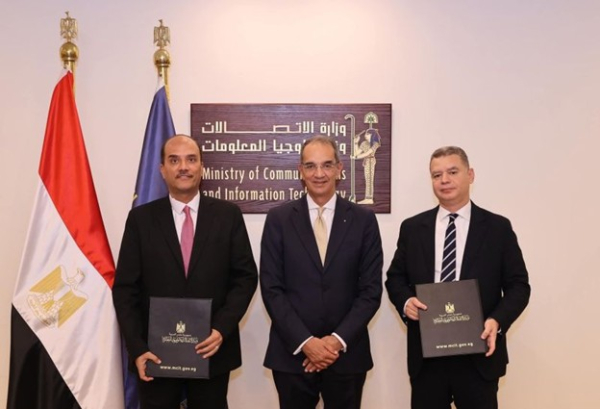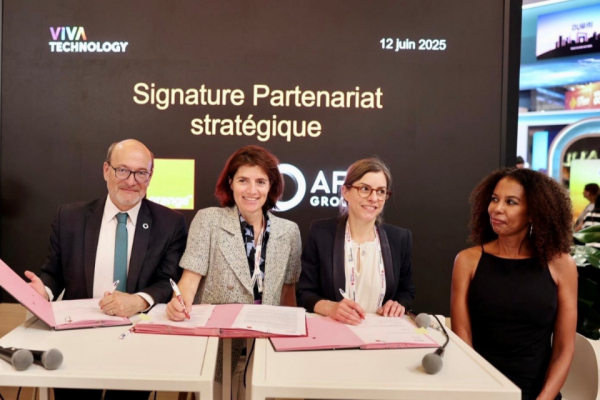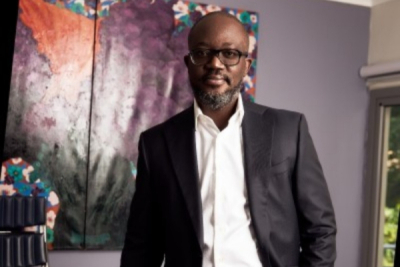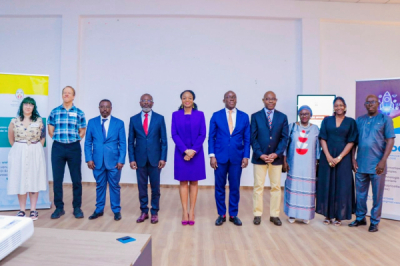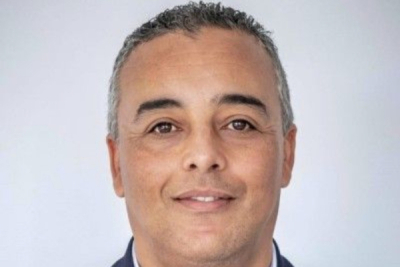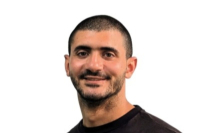As the ICT sector increasingly drives Egypt’s GDP, employment, and export revenues, the demand for skilled professionals is growing rapidly. However, without targeted interventions, there is a risk of deepening regional disparities in access to these new opportunities.
The Information Technology Industry Development Agency (ITIDA) and Arish University signed a renewed cooperation agreement in the presence of Minister of Communications and Information Technology Amr Talaat, reaffirming their commitment to equipping youth in North Sinai with essential digital skills. The three-year agreement, announced June 15, aims to equip young people in North Sinai with essential digital skills, reinforcing national efforts to foster inclusive development and economic resilience.
Dr. Amr Talaat stated that the cooperation agreement aims to train North Sinai youth for freelance work in the ICT sector, creating job opportunities in Egypt and abroad without requiring relocation. It also supports entrepreneurship and the creation of IT startups. He reaffirmed the Ministry's commitment to assisting the University in its developmental role in North Sinai.
This renewed partnership builds on a 2022 agreement and targets the training of approximately 7,200 students from Arish University and other youth across the governorate. The initiative will focus on high-demand fields such as software development, cybersecurity, freelancing, and entrepreneurship, opening up pathways to employment both locally and globally.
The training program includes summer internships facilitated through the National Telecom Institute, support for graduation projects, English language enhancement, and digital literacy courses. These components are designed to strengthen both technical and soft skills, making graduates more competitive in Egypt's growing digital economy.
To ensure long-term sustainability, the agreement also includes provisions for training and certifying local instructors, thereby building a pipeline of qualified trainers who can continue to deliver digital skills programs in the region.
The renewed partnership between ITIDA and Arish University is particularly significant given that Egypt’s ICT sector has become the fastest-growing segment of the national economy for the sixth consecutive year, recording a growth rate of about 14.4% in the 2023/2024 fiscal year, according to ITIDA's industry outlook.
This rapid expansion has heightened the demand for skilled digital professionals, making inclusive talent development a national priority. By equipping youth in North Sinai with in-demand ICT skills, the initiative not only addresses regional disparities but also ensures that underserved communities are integrated into Egypt’s digital transformation and economic growth trajectory.
Hikmatu Bilali
Digital technology is emerging as a key driver of development, with public-private partnerships multiplying to bridge the digital divide, foster local innovation, and improve access to essential services across Africa.
On Thursday, June 12, on the sidelines of VivaTech 2025, telecommunications group Orange and the French Development Agency (AFD) formalized a three-year framework agreement aimed at strengthening their cooperation in the digital sector, particularly across Africa and the Middle East. This agreement establishes Orange as a key partner in advancing digital transformation across 17 countries in the MEA region.
"This strategic partnership with AFD Group marks an important milestone in our collaboration," said Christel Heydemann, CEO of Orange. "I am pleased to continue this momentum of international cooperation for a more inclusive and sustainable digital future."
The agreement's core objective is to broaden access to essential digital services and promote high-impact, sustainable digital solutions. It covers several critical areas, including the deployment of strategic infrastructure such as backbones and submarine cables, enhancing access to e-services in education, health, and agriculture, youth training, fostering digital entrepreneurship, and mitigating the sector’s environmental footprint. Furthermore, the partnership will address emerging topics like data ethics and the application of artificial intelligence for development.
This collaboration comes as demand for digital services surges across the African continent, driven by a digitally native youth demographic. However, significant disparities in access persist. According to the International Telecommunication Union (ITU), only 38% of Africans had internet access in 2024, considerably lower than the global average of 68%. The rural-urban divide is even more pronounced, with 57% coverage in urban areas compared to just 23% in rural regions, highlighting the substantial digital gap.
By combining their efforts, Orange and AFD aim to bolster the digital sovereignty of partner countries and contribute to achieving the United Nations Sustainable Development Goals through localized, inclusive, and responsible initiatives. The new cooperation framework will also reinforce existing projects, such as the 16 Orange Digital Centers across Africa and training programs supported by the Orange Foundations in Côte d’Ivoire, Guinea, Madagascar, and Tunisia, while simultaneously launching new initiatives in rural and vulnerable communities.
By Samira Njoya,
Editing by Sèna D. B. de Sodji
He designs solutions to simplify business payments in Ghana. He draws on experience gained in finance, telecommunications, and technology.
Tenu Awoonor, a Ghanaian entrepreneur with a background in technology and financial services, is the founder and CEO of The Blu Penguin, a digital payments company he launched in 2018. The startup offers a platform that enables merchants to accept multiple payment methods, including mobile money, bank cards, or QR codes, through a single interface.
The Blu Penguin targets small and medium-sized enterprises (SMEs), aiming to streamline their transaction processes. Its app provides a unified access point for managing payments without the need for multiple terminals or bank accounts. All payment flows are centralized in one platform, accessible via smartphone or payment terminal.
The system also includes an inventory management feature. This tool helps reduce cash usage, allows for transaction tracking, and opens access to financial services tailored to business needs.
Awoonor holds a bachelor’s degree in business and technology from the University of Connecticut-Stamford and earned a master’s in finance and management from The Wharton School in 2007. He began his career in 1999 as a support engineer at Aperture Technologies, an IT company.
In 2006, he joined food manufacturer General Mills as a financial analyst. The following year, he became Assistant Vice President at wealth management firm Merrill Lynch. In 2010, Awoonor transitioned into telecoms, joining Millicom International Cellular (Tigo) in Ghana, where he led market research and business intelligence before becoming Marketing Director. From 2014 to 2017, he served as Director of Strategy and Performance Management at Airtel Nigeria.
Melchior Koba
He designs training programs for Liberians in digital professions. He leads projects aimed at improving access to technical skills in Liberia.
Philip Bargin, a Liberian computer scientist, centers his work around training and advisory services to help build a more efficient national economy. He heads Innovation Hub Liberia (iHub Liberia), a social enterprise dedicated to strengthening digital skills and improving employability across the country.
Since its founding in 2019, iHub Liberia has offered professional training and IT consulting services targeting individuals, recent graduates, and businesses. Its programs cover key digital fields such as web development, data collection, graphic design, and database management.
The organization also hosts events focused on technology use, aiming to raise awareness about digital opportunities, connect young professionals with experts, and encourage skill-sharing. Beyond training, iHub Liberia supports organizations in shaping their digital strategies—offering services ranging from website development and online brand management to technical support.
“We ensure participants have a simple and comprehensive learning community where they can share ideas, ask questions, and challenge themselves with the new tools introduced during training,” the organization states. To ease access to courses and interactions, it relies on platforms such as WhatsApp, Zoom, and Google Meet.
In addition to his role at iHub Liberia, Bargin serves as a project manager at 7ven Oaks, a UK-based company that delivers tech solutions to small and medium enterprises. He began his career in 2018 at the Liberia Telecommunications Corporation, where he worked as an assistant project manager until 2023, while also lecturing at Starz University.
Bargin holds a bachelor’s degree in computer science from Starz University and a master’s in information systems management from Unicaf University in Cyprus. He also earned a master’s degree in computer science from Zhejiang University of Science and Technology in China.
By Melchior Koba,
Editing by Sèna D. B. de Sodji
Digital transformation has disrupted every sector, including the labor market. By 2030, more than 230 million jobs in sub-Saharan Africa will require digital skills.
The Togolese government has unveiled a plan to train 15,000 students from public universities in computer programming and artificial intelligence (AI) this year. This initiative is part of a broader program launched earlier this month in partnership with U.S.-based startup Kira Learning, which aims to eventually train 50,000 students annually. The program's ultimate goal is to boost youth employability.
In addition to teaching Python programming and AI fundamentals, the curriculum includes practical training in English. The course is entirely free and accessible online, combining interactive lessons, instructional videos, and hands-on exercises. It is supported by an AI-powered virtual tutor capable of delivering personalized guidance to learners.
“This training opens the door to real job opportunities, even for students outside of scientific disciplines. In just three months, a humanities or literature student could qualify for roles such as IT support technician, digital project assistant, junior webmaster, content moderator, or data annotator for AI,” the Ministry of Digital Economy and Digital Transformation explained in a statement.
The initiative comes amid a continent-wide shift driven by digital transformation. The International Finance Corporation (IFC) estimates that by 2030, over 230 million jobs in sub-Saharan Africa will require digital competencies.
In Togo, public universities in Lomé and Kara enroll around 100,000 students. The country also has a notably young population: according to the World Bank, 60% of its 8 million citizens are under the age of 25. While the official unemployment rate stands at just 1.7%, widespread underemployment continues to undermine household financial stability. The World Bank notes that visible underemployment—jobs with fewer than 35 hours per week—affects 60% of the workforce.
Despite its promise, the program has limitations. By targeting only public university students, it excludes thousands from private institutions. Moreover, while the program is free, access can still be hindered by practical barriers such as internet costs and a lack of essential devices like computers, tablets, or smartphones.
Nonetheless, the initiative represents a significant step toward equipping Togo’s youth with the digital skills increasingly demanded by today's job market.
By Isaac K. Kassouwi,
Editing by Sèna D. B. de Sodji
He designs digital solutions to optimize the organization of retail outlets. His work focuses on deploying practical tools to oversee and structure in-store operations.
Tunisian entrepreneur Walid Mzoughi is the co-founder and CEO of Winshot, a startup launched in 2019 that specializes in digitizing operational management for retail chains. Through Winshot, Mzoughi has developed a platform designed to centralize and monitor retail network activities in real time, covering everything from internal communication and quality control to team management and field data reporting.
Based in Tunis, Winshot targets store chains, franchises, and distribution networks looking to streamline internal processes and enhance coordination between headquarters and field teams.
The platform enables users to supervise task execution, report incidents, share documents, and maintain continuous communication through a single interface accessible via mobile or desktop. This solution aims to ensure performance, compliance, and responsiveness, particularly in a context where tracking local operations presents a significant challenge.
Walid Mzoughi earned a master’s degree in accounting sciences from the Institut des Hautes Études Commerciales of Carthage in 2007. He also holds an SA 8000 social auditor certification and an IFME corporate social responsibility credential, underscoring his expertise in social compliance and corporate responsibility.
Before founding Winshot, Mzoughi worked in both the public and private sectors, with a career focused on operational management and digital transformation. He began in 2004 at Tunisia’s National Social Security Fund, where he held various roles related to managing social procedures and digitizing declarations and payments.
He later joined Hayat Kimya, a consumer goods company, serving as supply chain and logistics manager starting in 2012, and then as retail merchandising manager from 2014 to 2017.
By Melchior Koba,
Editing by Sèna D. B. de Sodji
He is interested in the mechanisms that shape Egypt's economy, particularly focusing on sectors like insurance, where processes are often lengthy, expensive, or hard to access.
Egyptian entrepreneur Shady El Tohfa, co-founder and CEO of Amenli, aims to make insurance more accessible in Egypt through tech-driven solutions.
Founded in 2020, Amenli operates as a fully online insurance platform licensed by Egypt’s Financial Regulatory Authority. It offers various insurance products—including health, car, home, and business coverage—all accessible via a digital interface. While traditional insurance procedures can take weeks, the platform claims users can obtain a quote and sign up for coverage in just 60 seconds.
The company prioritizes a streamlined interface, rapid processes, and optimized claims management for individuals, families, and small to medium-sized enterprises. Amenli's mission is "to protect individuals and businesses from unexpected costs and incidents by offering a wide range of insurance policies issued by top local and global insurance providers," the company states.
Before launching Amenli, El Tohfa co-founded the AUC Business Association in 2013, a student organization at the American University in Cairo, where he served as president until 2014.
He earned a bachelor's degree in business administration from the American University in Cairo in 2015. His professional journey began in 2011 with internships at major companies like HSBC and Nestlé, before he transitioned into the startup ecosystem.
In 2015, he joined Paymob, an Egyptian fintech company operating across North Africa and the Middle East. At Paymob, he successively held the roles of business development director and chief commercial officer.
By Melchior Koba,
Editing by Sèna D. B. de Sodji
Digital transformation is a strategic lever for modernizing Mali’s public administration. By rethinking its public services, the government aims to boost state performance and improve citizens’ access to essential services.
Mali is preparing to deploy two new digital platforms aimed at modernizing its public administration: civil registry management software and an integrated human resources management system. Both solutions were presented on Tuesday, June 10, to the steering committee for the digitalization of the administration, as part of the digital transformation process initiated by the country's highest authorities.
The civil registry management software, developed by the National Agency for the Security of Civil Status Documents in collaboration with the Civil Status Data Processing Center, is designed to facilitate the registration, verification, and authentication of birth, marriage, and death certificates. Accessible on both computers and mobile devices, the tool will enable citizens to consult their documents remotely, streamlining often lengthy and complex administrative procedures.
The integrated human resources management system aims to centralize data on public sector employees from state services and local authorities. Its goal is to strengthen workforce control, enhance transparency in career management, and improve human resources planning.
These two platforms are part of a broader initiative led by the President of the Transition, General Assimi Goïta, to make the administration more efficient and accessible. They complement a series of tools already launched or currently being tested, including the integrated management system for foreign trade operations, the refinancing mechanism for decentralized financial systems called "N’GNA SÔRÔ!", and the certificate management platform for tanker truck calibration designed for the Malian Metrology Agency.
Through this progressive digital transformation, Mali seeks not only to simplify interactions between the administration and citizens but also to strengthen governance, combat document fraud, and better steer its public policies. According to the 2024 edition of the United Nations E-Government Development Index, the country now ranks 141st out of 193, demonstrating significant progress compared to previous years. These initiatives reflect a strong political will to catch up and reposition Mali among Africa's most digitally connected administrations.
By Samira Njoya,
Editing by Sèna D. B. de Sodji
Headed by Mayowa Akande and Bolaji Wahab, Vazzel aims to transform the fashion industry in Nigeria.
Vazzel is an online marketplace developed by a young Nigerian startup that allows fashion designers and vendors to launch their storefronts and showcase their collections. Customers on the platform can browse a wide selection of fashion products including textiles, bags, shoes, and accessories. Based in Lagos, the startup was founded in 2024 by Mayowa Akande and Bolaji Wahab.
“The market lacked a unified, tech-forward platform tailored for fashion vendors, especially in emerging markets, that also solves the prevalent issue of sizing in online fashion retail. [...] Vazzel differentiates itself through its AI sizing tool, local vendor focus, and simplified onboarding. This closes the gap between e-commerce infrastructure and body-personalized shopping experiences,” said Mayowa Akande in an interview with Disrupt Africa.
Although the platform does not yet have a mobile app, it offers a suite of “AI-inclusive” tools to streamline online store management, inventory tracking, customer engagement, and visibility on social media. The goal is to enable any stylist, designer, or fashion brand—even without technical expertise—to quickly bring their products online and reach a broader audience, both locally and internationally.
By integrating sales management, payments, and customer data, Vazzel functions as a one-stop shop for professionals in the fashion industry. The startup aims to expand into other African markets, with the ambition of nurturing a new generation of creators who can compete on a global stage. Its core mission is to connect African fashion with digital innovation while fostering local entrepreneurship.
By Adoni Conrad Quenum,
Editing by Feriol Bewa
VERA, a secure B2B communications platform, has partnered with cheqd, a payment infrastructure, to deliver verifiable digital identity and encrypted messaging for businesses across South Africa and beyond, it announced June 10.
The partnership kicks off with a beta launch of VERA’s platform on June 1st, 2025, tailored specifically for South African enterprises. A full minimum viable product (MVP) rollout is expected by the end of August.
This collaboration aims to build a verifiable identity ecosystem that empowers companies to communicate and transact with confidence—an increasingly critical need as cyber fraud and impersonation threats grow.
More...
Through technological innovation, Egypt aims to enhance its appeal, improve the traveler experience, and support its economic ambitions by 2030.
Egypt is scheduled to launch the pilot phase of its new digital visa-on-arrival system in mid-June at Cairo International Airport. This initiative marks a significant step in the country's strategy to leverage digital technologies, modernize immigration procedures, and enhance its appeal as a tourist destination.
The system, designed to streamline the arrival process for international travelers, will utilize self-service kiosks installed in airport terminals and a dedicated mobile application. Visitors will be able to obtain an emergency visa within minutes through a fully digital process, incorporating QR codes and electronic payments. The new service aims to reduce queues, eliminate paperwork, and expedite border processing.
This initiative is part of Egypt’s National Sustainable Tourism Strategy 2030, which targets attracting 30 million tourists annually by 2028. As the country’s primary point of entry, Cairo Airport will serve as the testing ground for the program. Its success will determine if it expands to other hubs such as Sharm el-Sheikh, Hurghada, and Luxor.
Beyond improving the traveler experience, the program seeks to position Egypt alongside other destinations that have embraced digital transformation to boost their tourism sectors. The government also anticipates the new system will attract more foreign currency and strengthen a sector that contributes approximately 12% to the national GDP.
Initially, the system will cater to travelers from countries already eligible for Egypt’s e-visa program, particularly those in Europe, North America, and the Middle East.
By Samira Njoya,
Editing by Sèna D. B. de Sodji
In Africa, technology offers promising alternatives to the shortage of healthcare professionals. With the rise of healthtech, e-health solutions are proliferating across the continent.
Kera Health is a digital health solution developed by a Senegalese startup. It offers an AI-powered platform designed to connect stakeholders across the healthcare system in Senegal. Backed by the International Finance Corporation (IFC) since 2023, Kera Health was founded in 2022 by Moustapha Cissé, Papa Sow, and Hosam Mattar. In June 2025, the healthtech announced a successful $10 million funding round to strengthen its digital infrastructure, expand its services to more cities across Senegal, and prepare for regional rollout.
“We are thrilled about this partnership with IFC, whose commitment to digitizing healthcare in Africa aligns perfectly with ours. As Africa stands on the brink of a demographic explosion, leveraging technology in healthcare is not just an opportunity, it’s a necessity,” said Moustapha Cissé in 2023, at the time of the startup’s collaboration announcement with IFC.
Through its platform, Kera Health aims to improve care coordination, address the shortage of healthcare professionals, and enhance the safety and efficiency of the medical system. It centralizes health data—medical records, lab results, prescriptions, insurance coverage, and more—within a secure interface accessible to authorized professionals. This leads to fewer errors, improved continuity of care, and faster, more accurate diagnoses.
The solution harnesses AI algorithms to detect trends, automate certain types of monitoring, and support medical decision-making. It also adheres to the highest standards of data security. The startup's broader ambition is to make connected healthcare a reality for everyone, from downtown Dakar to the country’s most remote areas, before scaling to other countries in the region.
By Adoni Conrad Quenum,
Editing by Feriol Bewa
Drawing on his background as an investment banker in the financial sector, he shifted his focus to transforming the agricultural industry. His career path demonstrates a clear resolve to address economic challenges with practical solutions.
A finance expert and tech entrepreneur, South African Eugene Roodt (photo) has emerged as one of the key figures in the transformation of African agriculture. As co-founder of the startup Nile, he is betting on technology to bridge the gap between farmers and both regional and international markets, while improving their access to financing and agricultural inputs.
In 2020, alongside Louis de Kock and Rick Kleynhans, Roodt launched Nile.ag with the aim of removing the structural barriers that hinder agricultural trade across the continent. The platform operates as a digital marketplace, allowing farmers to sell their fresh produce directly to professional buyers. It integrates digital tools for managing logistics, traceability, quality control, and payments.
With a processing capacity of 2,500 tons of fresh produce per day, Nile now serves clients in 38 countries. It offers an alternative to traditional supply chains by cutting out middlemen, speeding up payments, and increasing transparency around pricing and product quality. The platform also includes a marketplace for agricultural inputs, helping farmers invest, grow, and gain independence.
On Tuesday, June 10, 2025, Nile announced a $11.3 million fundraising round to scale its impact and promote wider adoption of digital commerce among African farmers.
Eugene Roodt holds a bachelor’s degree in accounting and finance from Stellenbosch University, earned in 2013. Before venturing into entrepreneurship, he worked as an investment banker at J.P. Morgan between 2017 and 2020.
By Melchior Koba,
Editing by Sèna D. B. de Sodji
With her background, she has become a supportive mentor, dedicated to developing young talent and building an inclusive tech ecosystem.
Andréa Zafitody Li-Sai Chimento (photo) is a computer engineer who graduated from the National Institute of Applied Sciences in Lyon (INSA) in 1990. In 2019, she founded Zafy Tody, a tech startup incubator that stands out for its fully volunteer-based model.
Zafy Tody supports early-stage Malagasy startups without taking equity or ownership stakes, offering tailored guidance instead. Each year, the incubator selects between five and ten startups to join a six-month program known as the Seed Program. This initiative includes seed funding, access to workspace, hands-on workshops, and one-on-one mentorship.
The incubator has also built a training platform tailored to the needs of entrepreneurs and businesses undergoing digital transformation. Its modules cover UX/UI design, technological innovation, and entrepreneurship, with the aim of strengthening local capacity and fostering digital solutions adapted to Madagascar’s specific context.
Alongside her work at Zafy Tody, Zafitody Li-Sai Chimento plays a strategic advisory role within the African tech ecosystem. She serves as a senior advisor to the CEO of Axian Group—a leading digital player in Madagascar and across Africa—and sits on the advisory board of Novulis Consulting, a firm specializing in digital transformation.
She began as a solutions architect at IBM Global Services France, then joined Microsoft in 1997. Starting as a business services consultant in France, she moved on to managerial roles in Italy and later across Europe, the Middle East, and Africa. She oversaw enterprise services, led the Microsoft 4Afrika Academy in the region, and served as managing director in the Gulf.
In 2013, she joined Oracle in the Middle East as head of consulting services. In 2019, she moved to Amazon Web Services, where she has worked, among other roles, as head of enterprise business acceleration for Europe, the Middle East, and Africa.
By Melchior Koba,
Editing by Sèna D. B. de Sodji


